Schizophrenia: Management & Recovery
VerifiedAdded on 2020/02/24
|9
|2401
|52
AI Summary
This assignment analyzes schizophrenia, focusing on its disabling symptoms and effective management through medication and psychotherapy. It emphasizes personalized treatment plans for shorter recovery periods. The documentary 'Sunnyboy' illustrates how recovery principles apply to individuals with schizophrenia.
Contribute Materials
Your contribution can guide someone’s learning journey. Share your
documents today.
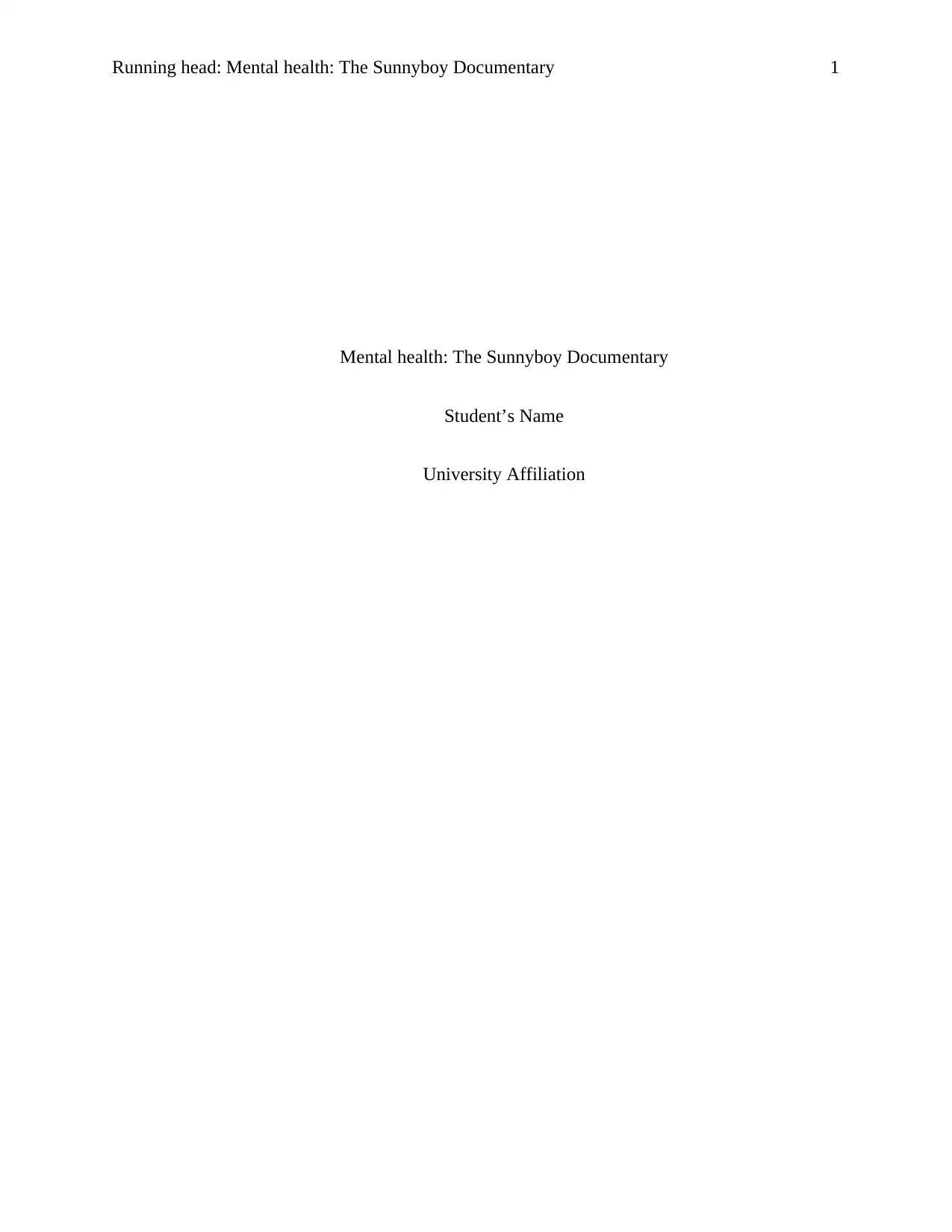
Running head: Mental health: The Sunnyboy Documentary 1
Mental health: The Sunnyboy Documentary
Student’s Name
University Affiliation
Mental health: The Sunnyboy Documentary
Student’s Name
University Affiliation
Secure Best Marks with AI Grader
Need help grading? Try our AI Grader for instant feedback on your assignments.
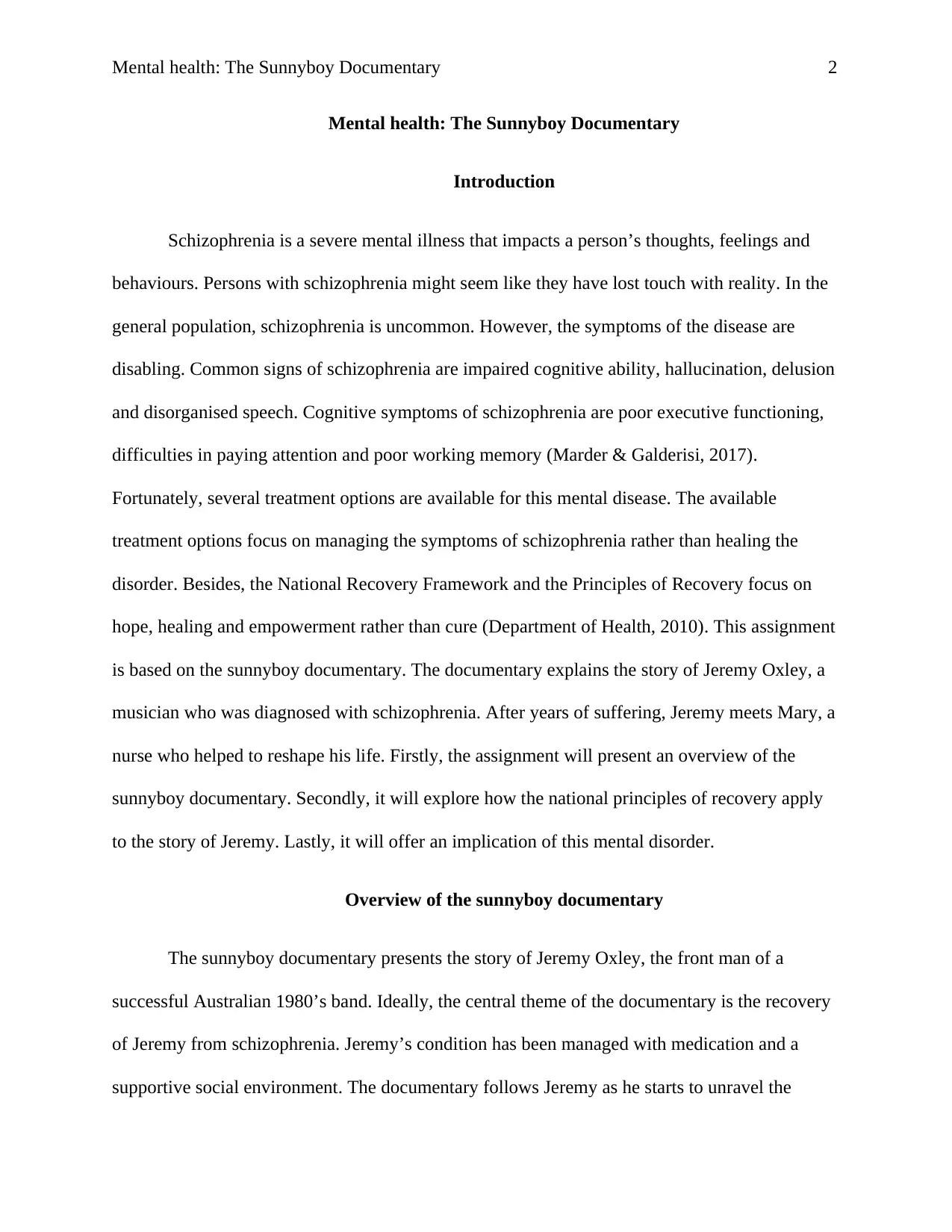
Mental health: The Sunnyboy Documentary 2
Mental health: The Sunnyboy Documentary
Introduction
Schizophrenia is a severe mental illness that impacts a person’s thoughts, feelings and
behaviours. Persons with schizophrenia might seem like they have lost touch with reality. In the
general population, schizophrenia is uncommon. However, the symptoms of the disease are
disabling. Common signs of schizophrenia are impaired cognitive ability, hallucination, delusion
and disorganised speech. Cognitive symptoms of schizophrenia are poor executive functioning,
difficulties in paying attention and poor working memory (Marder & Galderisi, 2017).
Fortunately, several treatment options are available for this mental disease. The available
treatment options focus on managing the symptoms of schizophrenia rather than healing the
disorder. Besides, the National Recovery Framework and the Principles of Recovery focus on
hope, healing and empowerment rather than cure (Department of Health, 2010). This assignment
is based on the sunnyboy documentary. The documentary explains the story of Jeremy Oxley, a
musician who was diagnosed with schizophrenia. After years of suffering, Jeremy meets Mary, a
nurse who helped to reshape his life. Firstly, the assignment will present an overview of the
sunnyboy documentary. Secondly, it will explore how the national principles of recovery apply
to the story of Jeremy. Lastly, it will offer an implication of this mental disorder.
Overview of the sunnyboy documentary
The sunnyboy documentary presents the story of Jeremy Oxley, the front man of a
successful Australian 1980’s band. Ideally, the central theme of the documentary is the recovery
of Jeremy from schizophrenia. Jeremy’s condition has been managed with medication and a
supportive social environment. The documentary follows Jeremy as he starts to unravel the
Mental health: The Sunnyboy Documentary
Introduction
Schizophrenia is a severe mental illness that impacts a person’s thoughts, feelings and
behaviours. Persons with schizophrenia might seem like they have lost touch with reality. In the
general population, schizophrenia is uncommon. However, the symptoms of the disease are
disabling. Common signs of schizophrenia are impaired cognitive ability, hallucination, delusion
and disorganised speech. Cognitive symptoms of schizophrenia are poor executive functioning,
difficulties in paying attention and poor working memory (Marder & Galderisi, 2017).
Fortunately, several treatment options are available for this mental disease. The available
treatment options focus on managing the symptoms of schizophrenia rather than healing the
disorder. Besides, the National Recovery Framework and the Principles of Recovery focus on
hope, healing and empowerment rather than cure (Department of Health, 2010). This assignment
is based on the sunnyboy documentary. The documentary explains the story of Jeremy Oxley, a
musician who was diagnosed with schizophrenia. After years of suffering, Jeremy meets Mary, a
nurse who helped to reshape his life. Firstly, the assignment will present an overview of the
sunnyboy documentary. Secondly, it will explore how the national principles of recovery apply
to the story of Jeremy. Lastly, it will offer an implication of this mental disorder.
Overview of the sunnyboy documentary
The sunnyboy documentary presents the story of Jeremy Oxley, the front man of a
successful Australian 1980’s band. Ideally, the central theme of the documentary is the recovery
of Jeremy from schizophrenia. Jeremy’s condition has been managed with medication and a
supportive social environment. The documentary follows Jeremy as he starts to unravel the
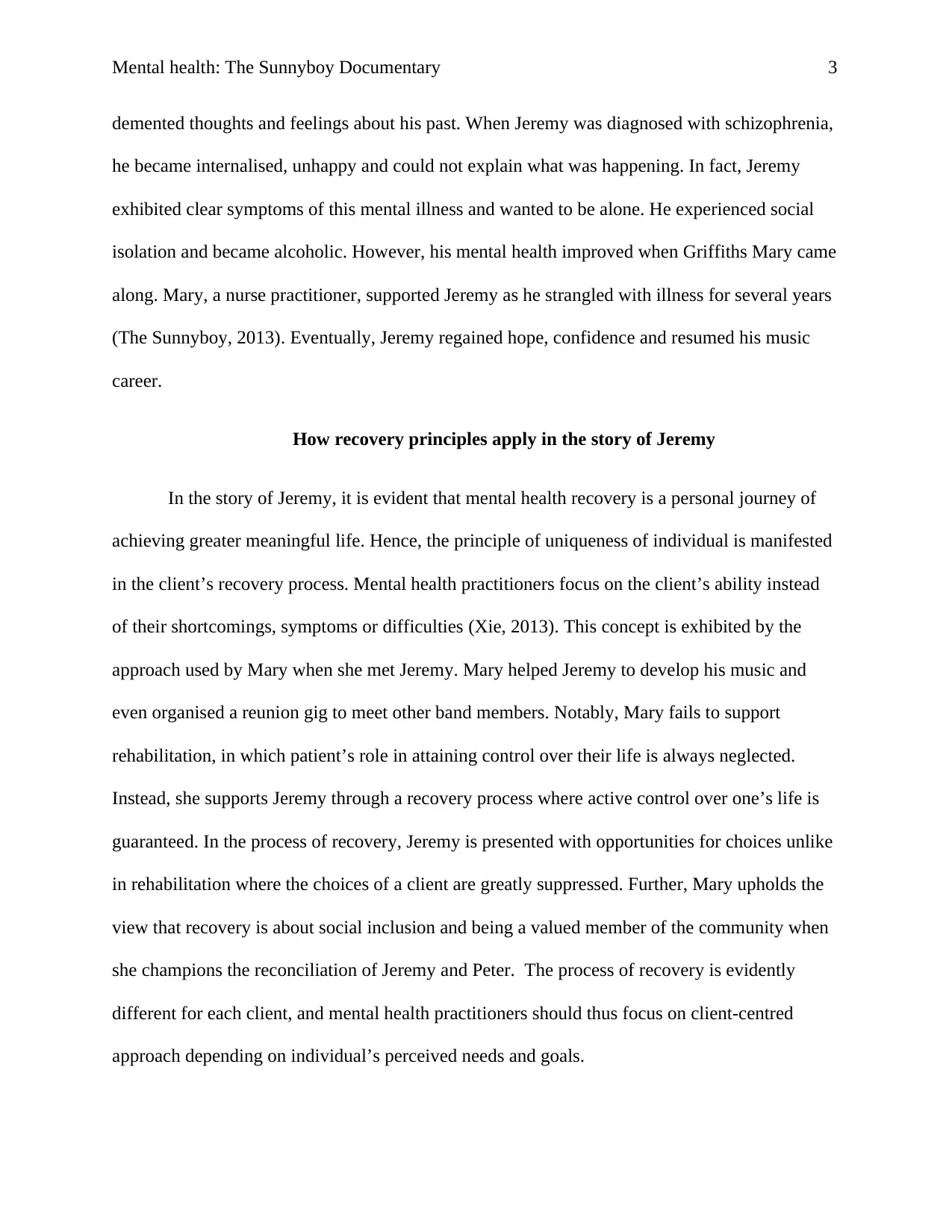
Mental health: The Sunnyboy Documentary 3
demented thoughts and feelings about his past. When Jeremy was diagnosed with schizophrenia,
he became internalised, unhappy and could not explain what was happening. In fact, Jeremy
exhibited clear symptoms of this mental illness and wanted to be alone. He experienced social
isolation and became alcoholic. However, his mental health improved when Griffiths Mary came
along. Mary, a nurse practitioner, supported Jeremy as he strangled with illness for several years
(The Sunnyboy, 2013). Eventually, Jeremy regained hope, confidence and resumed his music
career.
How recovery principles apply in the story of Jeremy
In the story of Jeremy, it is evident that mental health recovery is a personal journey of
achieving greater meaningful life. Hence, the principle of uniqueness of individual is manifested
in the client’s recovery process. Mental health practitioners focus on the client’s ability instead
of their shortcomings, symptoms or difficulties (Xie, 2013). This concept is exhibited by the
approach used by Mary when she met Jeremy. Mary helped Jeremy to develop his music and
even organised a reunion gig to meet other band members. Notably, Mary fails to support
rehabilitation, in which patient’s role in attaining control over their life is always neglected.
Instead, she supports Jeremy through a recovery process where active control over one’s life is
guaranteed. In the process of recovery, Jeremy is presented with opportunities for choices unlike
in rehabilitation where the choices of a client are greatly suppressed. Further, Mary upholds the
view that recovery is about social inclusion and being a valued member of the community when
she champions the reconciliation of Jeremy and Peter. The process of recovery is evidently
different for each client, and mental health practitioners should thus focus on client-centred
approach depending on individual’s perceived needs and goals.
demented thoughts and feelings about his past. When Jeremy was diagnosed with schizophrenia,
he became internalised, unhappy and could not explain what was happening. In fact, Jeremy
exhibited clear symptoms of this mental illness and wanted to be alone. He experienced social
isolation and became alcoholic. However, his mental health improved when Griffiths Mary came
along. Mary, a nurse practitioner, supported Jeremy as he strangled with illness for several years
(The Sunnyboy, 2013). Eventually, Jeremy regained hope, confidence and resumed his music
career.
How recovery principles apply in the story of Jeremy
In the story of Jeremy, it is evident that mental health recovery is a personal journey of
achieving greater meaningful life. Hence, the principle of uniqueness of individual is manifested
in the client’s recovery process. Mental health practitioners focus on the client’s ability instead
of their shortcomings, symptoms or difficulties (Xie, 2013). This concept is exhibited by the
approach used by Mary when she met Jeremy. Mary helped Jeremy to develop his music and
even organised a reunion gig to meet other band members. Notably, Mary fails to support
rehabilitation, in which patient’s role in attaining control over their life is always neglected.
Instead, she supports Jeremy through a recovery process where active control over one’s life is
guaranteed. In the process of recovery, Jeremy is presented with opportunities for choices unlike
in rehabilitation where the choices of a client are greatly suppressed. Further, Mary upholds the
view that recovery is about social inclusion and being a valued member of the community when
she champions the reconciliation of Jeremy and Peter. The process of recovery is evidently
different for each client, and mental health practitioners should thus focus on client-centred
approach depending on individual’s perceived needs and goals.
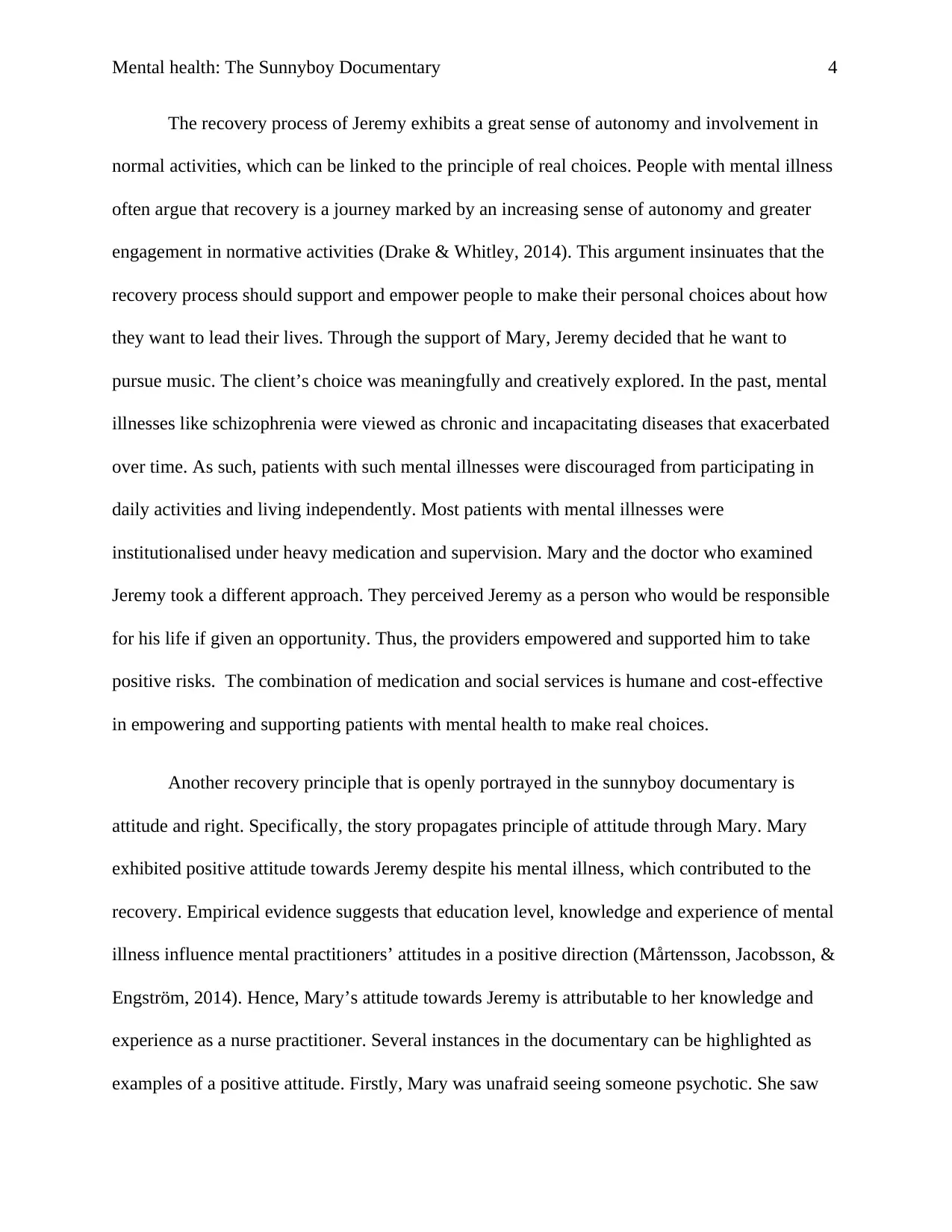
Mental health: The Sunnyboy Documentary 4
The recovery process of Jeremy exhibits a great sense of autonomy and involvement in
normal activities, which can be linked to the principle of real choices. People with mental illness
often argue that recovery is a journey marked by an increasing sense of autonomy and greater
engagement in normative activities (Drake & Whitley, 2014). This argument insinuates that the
recovery process should support and empower people to make their personal choices about how
they want to lead their lives. Through the support of Mary, Jeremy decided that he want to
pursue music. The client’s choice was meaningfully and creatively explored. In the past, mental
illnesses like schizophrenia were viewed as chronic and incapacitating diseases that exacerbated
over time. As such, patients with such mental illnesses were discouraged from participating in
daily activities and living independently. Most patients with mental illnesses were
institutionalised under heavy medication and supervision. Mary and the doctor who examined
Jeremy took a different approach. They perceived Jeremy as a person who would be responsible
for his life if given an opportunity. Thus, the providers empowered and supported him to take
positive risks. The combination of medication and social services is humane and cost-effective
in empowering and supporting patients with mental health to make real choices.
Another recovery principle that is openly portrayed in the sunnyboy documentary is
attitude and right. Specifically, the story propagates principle of attitude through Mary. Mary
exhibited positive attitude towards Jeremy despite his mental illness, which contributed to the
recovery. Empirical evidence suggests that education level, knowledge and experience of mental
illness influence mental practitioners’ attitudes in a positive direction (Mårtensson, Jacobsson, &
Engström, 2014). Hence, Mary’s attitude towards Jeremy is attributable to her knowledge and
experience as a nurse practitioner. Several instances in the documentary can be highlighted as
examples of a positive attitude. Firstly, Mary was unafraid seeing someone psychotic. She saw
The recovery process of Jeremy exhibits a great sense of autonomy and involvement in
normal activities, which can be linked to the principle of real choices. People with mental illness
often argue that recovery is a journey marked by an increasing sense of autonomy and greater
engagement in normative activities (Drake & Whitley, 2014). This argument insinuates that the
recovery process should support and empower people to make their personal choices about how
they want to lead their lives. Through the support of Mary, Jeremy decided that he want to
pursue music. The client’s choice was meaningfully and creatively explored. In the past, mental
illnesses like schizophrenia were viewed as chronic and incapacitating diseases that exacerbated
over time. As such, patients with such mental illnesses were discouraged from participating in
daily activities and living independently. Most patients with mental illnesses were
institutionalised under heavy medication and supervision. Mary and the doctor who examined
Jeremy took a different approach. They perceived Jeremy as a person who would be responsible
for his life if given an opportunity. Thus, the providers empowered and supported him to take
positive risks. The combination of medication and social services is humane and cost-effective
in empowering and supporting patients with mental health to make real choices.
Another recovery principle that is openly portrayed in the sunnyboy documentary is
attitude and right. Specifically, the story propagates principle of attitude through Mary. Mary
exhibited positive attitude towards Jeremy despite his mental illness, which contributed to the
recovery. Empirical evidence suggests that education level, knowledge and experience of mental
illness influence mental practitioners’ attitudes in a positive direction (Mårtensson, Jacobsson, &
Engström, 2014). Hence, Mary’s attitude towards Jeremy is attributable to her knowledge and
experience as a nurse practitioner. Several instances in the documentary can be highlighted as
examples of a positive attitude. Firstly, Mary was unafraid seeing someone psychotic. She saw
Secure Best Marks with AI Grader
Need help grading? Try our AI Grader for instant feedback on your assignments.
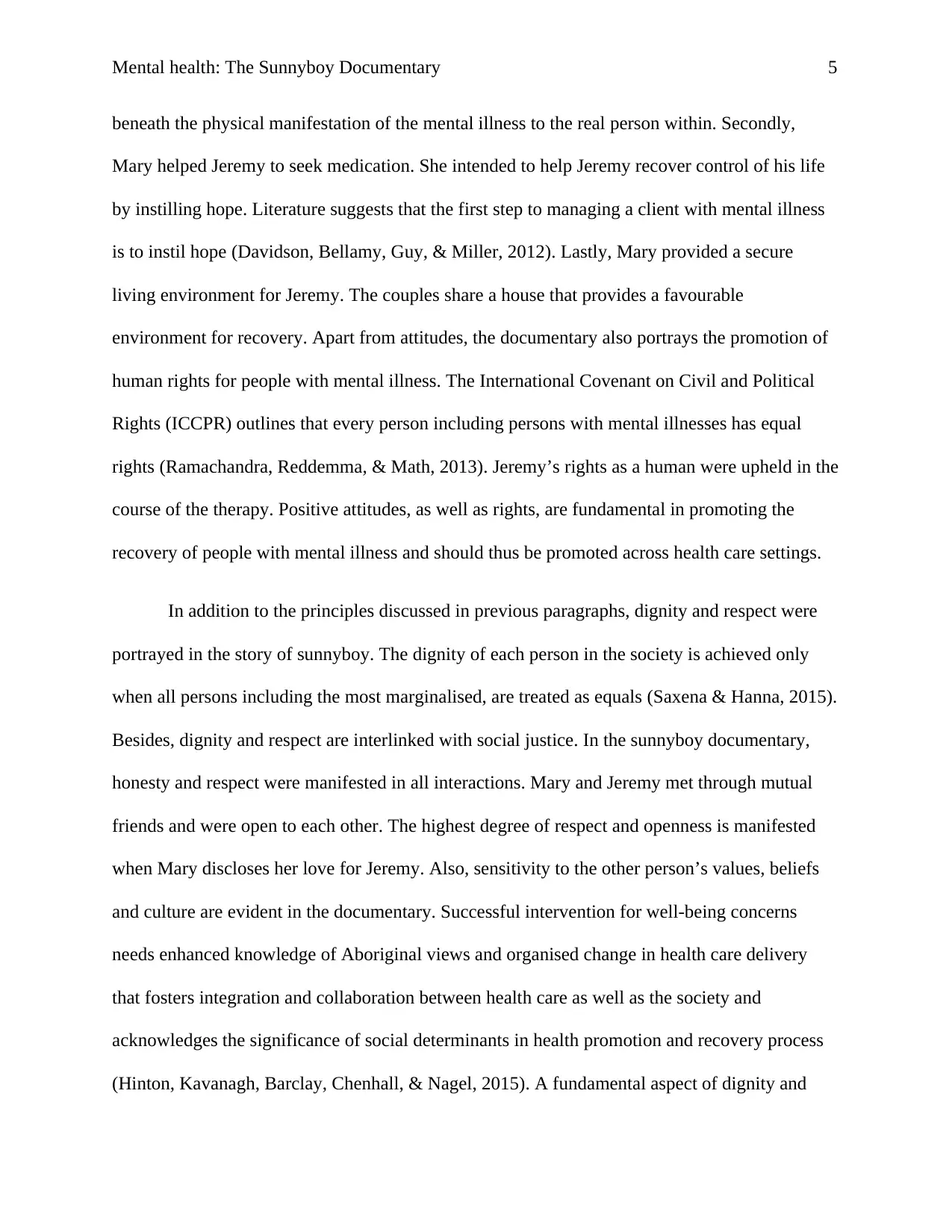
Mental health: The Sunnyboy Documentary 5
beneath the physical manifestation of the mental illness to the real person within. Secondly,
Mary helped Jeremy to seek medication. She intended to help Jeremy recover control of his life
by instilling hope. Literature suggests that the first step to managing a client with mental illness
is to instil hope (Davidson, Bellamy, Guy, & Miller, 2012). Lastly, Mary provided a secure
living environment for Jeremy. The couples share a house that provides a favourable
environment for recovery. Apart from attitudes, the documentary also portrays the promotion of
human rights for people with mental illness. The International Covenant on Civil and Political
Rights (ICCPR) outlines that every person including persons with mental illnesses has equal
rights (Ramachandra, Reddemma, & Math, 2013). Jeremy’s rights as a human were upheld in the
course of the therapy. Positive attitudes, as well as rights, are fundamental in promoting the
recovery of people with mental illness and should thus be promoted across health care settings.
In addition to the principles discussed in previous paragraphs, dignity and respect were
portrayed in the story of sunnyboy. The dignity of each person in the society is achieved only
when all persons including the most marginalised, are treated as equals (Saxena & Hanna, 2015).
Besides, dignity and respect are interlinked with social justice. In the sunnyboy documentary,
honesty and respect were manifested in all interactions. Mary and Jeremy met through mutual
friends and were open to each other. The highest degree of respect and openness is manifested
when Mary discloses her love for Jeremy. Also, sensitivity to the other person’s values, beliefs
and culture are evident in the documentary. Successful intervention for well-being concerns
needs enhanced knowledge of Aboriginal views and organised change in health care delivery
that fosters integration and collaboration between health care as well as the society and
acknowledges the significance of social determinants in health promotion and recovery process
(Hinton, Kavanagh, Barclay, Chenhall, & Nagel, 2015). A fundamental aspect of dignity and
beneath the physical manifestation of the mental illness to the real person within. Secondly,
Mary helped Jeremy to seek medication. She intended to help Jeremy recover control of his life
by instilling hope. Literature suggests that the first step to managing a client with mental illness
is to instil hope (Davidson, Bellamy, Guy, & Miller, 2012). Lastly, Mary provided a secure
living environment for Jeremy. The couples share a house that provides a favourable
environment for recovery. Apart from attitudes, the documentary also portrays the promotion of
human rights for people with mental illness. The International Covenant on Civil and Political
Rights (ICCPR) outlines that every person including persons with mental illnesses has equal
rights (Ramachandra, Reddemma, & Math, 2013). Jeremy’s rights as a human were upheld in the
course of the therapy. Positive attitudes, as well as rights, are fundamental in promoting the
recovery of people with mental illness and should thus be promoted across health care settings.
In addition to the principles discussed in previous paragraphs, dignity and respect were
portrayed in the story of sunnyboy. The dignity of each person in the society is achieved only
when all persons including the most marginalised, are treated as equals (Saxena & Hanna, 2015).
Besides, dignity and respect are interlinked with social justice. In the sunnyboy documentary,
honesty and respect were manifested in all interactions. Mary and Jeremy met through mutual
friends and were open to each other. The highest degree of respect and openness is manifested
when Mary discloses her love for Jeremy. Also, sensitivity to the other person’s values, beliefs
and culture are evident in the documentary. Successful intervention for well-being concerns
needs enhanced knowledge of Aboriginal views and organised change in health care delivery
that fosters integration and collaboration between health care as well as the society and
acknowledges the significance of social determinants in health promotion and recovery process
(Hinton, Kavanagh, Barclay, Chenhall, & Nagel, 2015). A fundamental aspect of dignity and
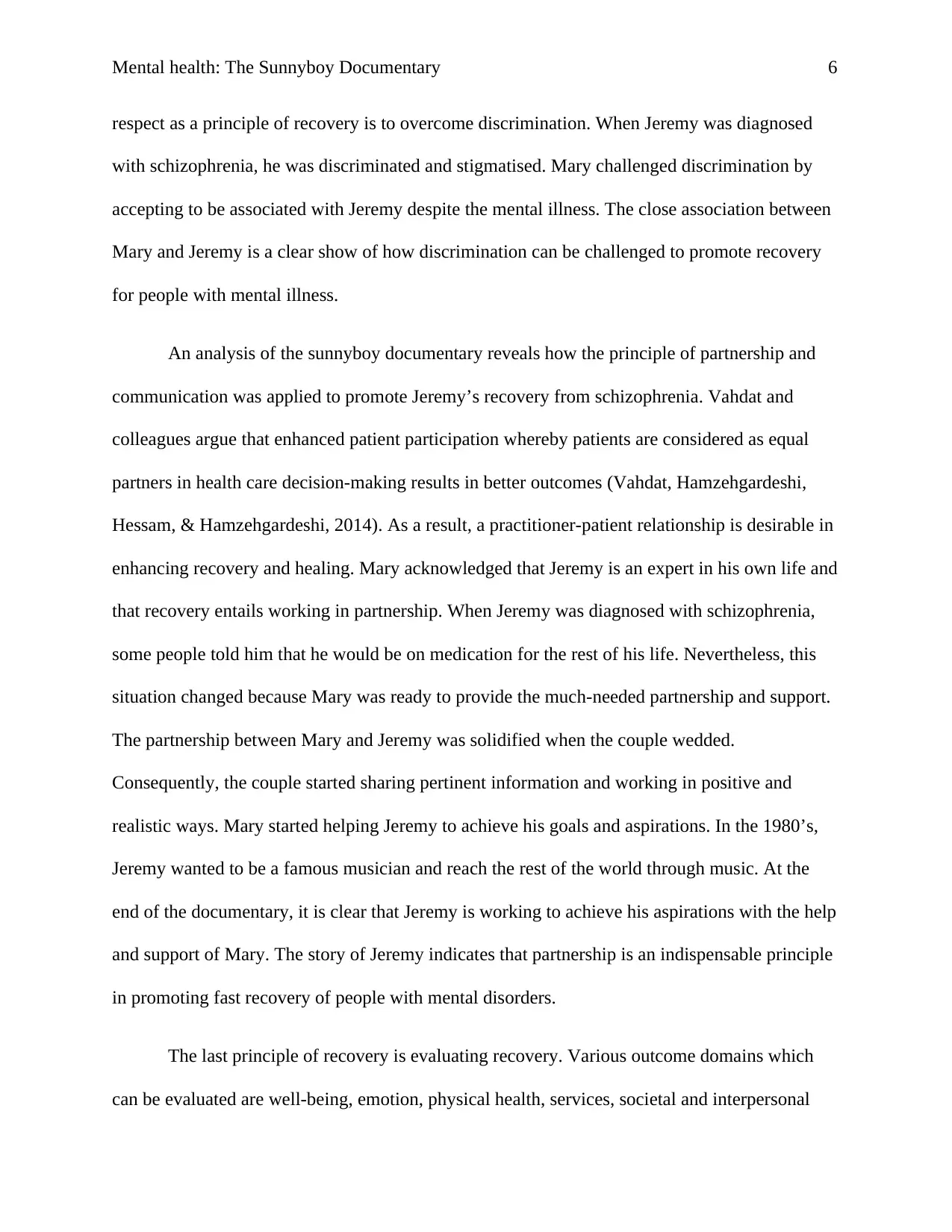
Mental health: The Sunnyboy Documentary 6
respect as a principle of recovery is to overcome discrimination. When Jeremy was diagnosed
with schizophrenia, he was discriminated and stigmatised. Mary challenged discrimination by
accepting to be associated with Jeremy despite the mental illness. The close association between
Mary and Jeremy is a clear show of how discrimination can be challenged to promote recovery
for people with mental illness.
An analysis of the sunnyboy documentary reveals how the principle of partnership and
communication was applied to promote Jeremy’s recovery from schizophrenia. Vahdat and
colleagues argue that enhanced patient participation whereby patients are considered as equal
partners in health care decision-making results in better outcomes (Vahdat, Hamzehgardeshi,
Hessam, & Hamzehgardeshi, 2014). As a result, a practitioner-patient relationship is desirable in
enhancing recovery and healing. Mary acknowledged that Jeremy is an expert in his own life and
that recovery entails working in partnership. When Jeremy was diagnosed with schizophrenia,
some people told him that he would be on medication for the rest of his life. Nevertheless, this
situation changed because Mary was ready to provide the much-needed partnership and support.
The partnership between Mary and Jeremy was solidified when the couple wedded.
Consequently, the couple started sharing pertinent information and working in positive and
realistic ways. Mary started helping Jeremy to achieve his goals and aspirations. In the 1980’s,
Jeremy wanted to be a famous musician and reach the rest of the world through music. At the
end of the documentary, it is clear that Jeremy is working to achieve his aspirations with the help
and support of Mary. The story of Jeremy indicates that partnership is an indispensable principle
in promoting fast recovery of people with mental disorders.
The last principle of recovery is evaluating recovery. Various outcome domains which
can be evaluated are well-being, emotion, physical health, services, societal and interpersonal
respect as a principle of recovery is to overcome discrimination. When Jeremy was diagnosed
with schizophrenia, he was discriminated and stigmatised. Mary challenged discrimination by
accepting to be associated with Jeremy despite the mental illness. The close association between
Mary and Jeremy is a clear show of how discrimination can be challenged to promote recovery
for people with mental illness.
An analysis of the sunnyboy documentary reveals how the principle of partnership and
communication was applied to promote Jeremy’s recovery from schizophrenia. Vahdat and
colleagues argue that enhanced patient participation whereby patients are considered as equal
partners in health care decision-making results in better outcomes (Vahdat, Hamzehgardeshi,
Hessam, & Hamzehgardeshi, 2014). As a result, a practitioner-patient relationship is desirable in
enhancing recovery and healing. Mary acknowledged that Jeremy is an expert in his own life and
that recovery entails working in partnership. When Jeremy was diagnosed with schizophrenia,
some people told him that he would be on medication for the rest of his life. Nevertheless, this
situation changed because Mary was ready to provide the much-needed partnership and support.
The partnership between Mary and Jeremy was solidified when the couple wedded.
Consequently, the couple started sharing pertinent information and working in positive and
realistic ways. Mary started helping Jeremy to achieve his goals and aspirations. In the 1980’s,
Jeremy wanted to be a famous musician and reach the rest of the world through music. At the
end of the documentary, it is clear that Jeremy is working to achieve his aspirations with the help
and support of Mary. The story of Jeremy indicates that partnership is an indispensable principle
in promoting fast recovery of people with mental disorders.
The last principle of recovery is evaluating recovery. Various outcome domains which
can be evaluated are well-being, emotion, physical health, services, societal and interpersonal
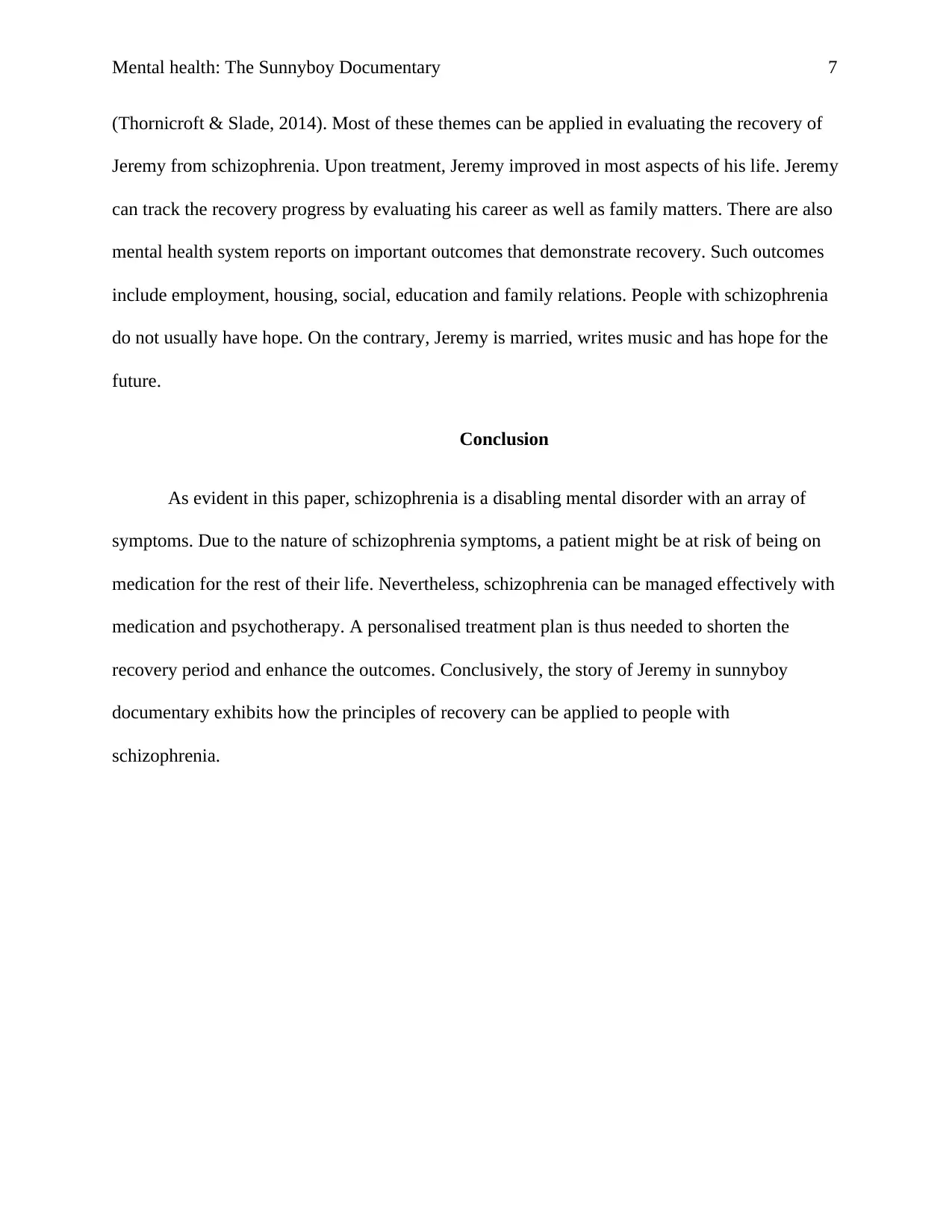
Mental health: The Sunnyboy Documentary 7
(Thornicroft & Slade, 2014). Most of these themes can be applied in evaluating the recovery of
Jeremy from schizophrenia. Upon treatment, Jeremy improved in most aspects of his life. Jeremy
can track the recovery progress by evaluating his career as well as family matters. There are also
mental health system reports on important outcomes that demonstrate recovery. Such outcomes
include employment, housing, social, education and family relations. People with schizophrenia
do not usually have hope. On the contrary, Jeremy is married, writes music and has hope for the
future.
Conclusion
As evident in this paper, schizophrenia is a disabling mental disorder with an array of
symptoms. Due to the nature of schizophrenia symptoms, a patient might be at risk of being on
medication for the rest of their life. Nevertheless, schizophrenia can be managed effectively with
medication and psychotherapy. A personalised treatment plan is thus needed to shorten the
recovery period and enhance the outcomes. Conclusively, the story of Jeremy in sunnyboy
documentary exhibits how the principles of recovery can be applied to people with
schizophrenia.
(Thornicroft & Slade, 2014). Most of these themes can be applied in evaluating the recovery of
Jeremy from schizophrenia. Upon treatment, Jeremy improved in most aspects of his life. Jeremy
can track the recovery progress by evaluating his career as well as family matters. There are also
mental health system reports on important outcomes that demonstrate recovery. Such outcomes
include employment, housing, social, education and family relations. People with schizophrenia
do not usually have hope. On the contrary, Jeremy is married, writes music and has hope for the
future.
Conclusion
As evident in this paper, schizophrenia is a disabling mental disorder with an array of
symptoms. Due to the nature of schizophrenia symptoms, a patient might be at risk of being on
medication for the rest of their life. Nevertheless, schizophrenia can be managed effectively with
medication and psychotherapy. A personalised treatment plan is thus needed to shorten the
recovery period and enhance the outcomes. Conclusively, the story of Jeremy in sunnyboy
documentary exhibits how the principles of recovery can be applied to people with
schizophrenia.
Paraphrase This Document
Need a fresh take? Get an instant paraphrase of this document with our AI Paraphraser
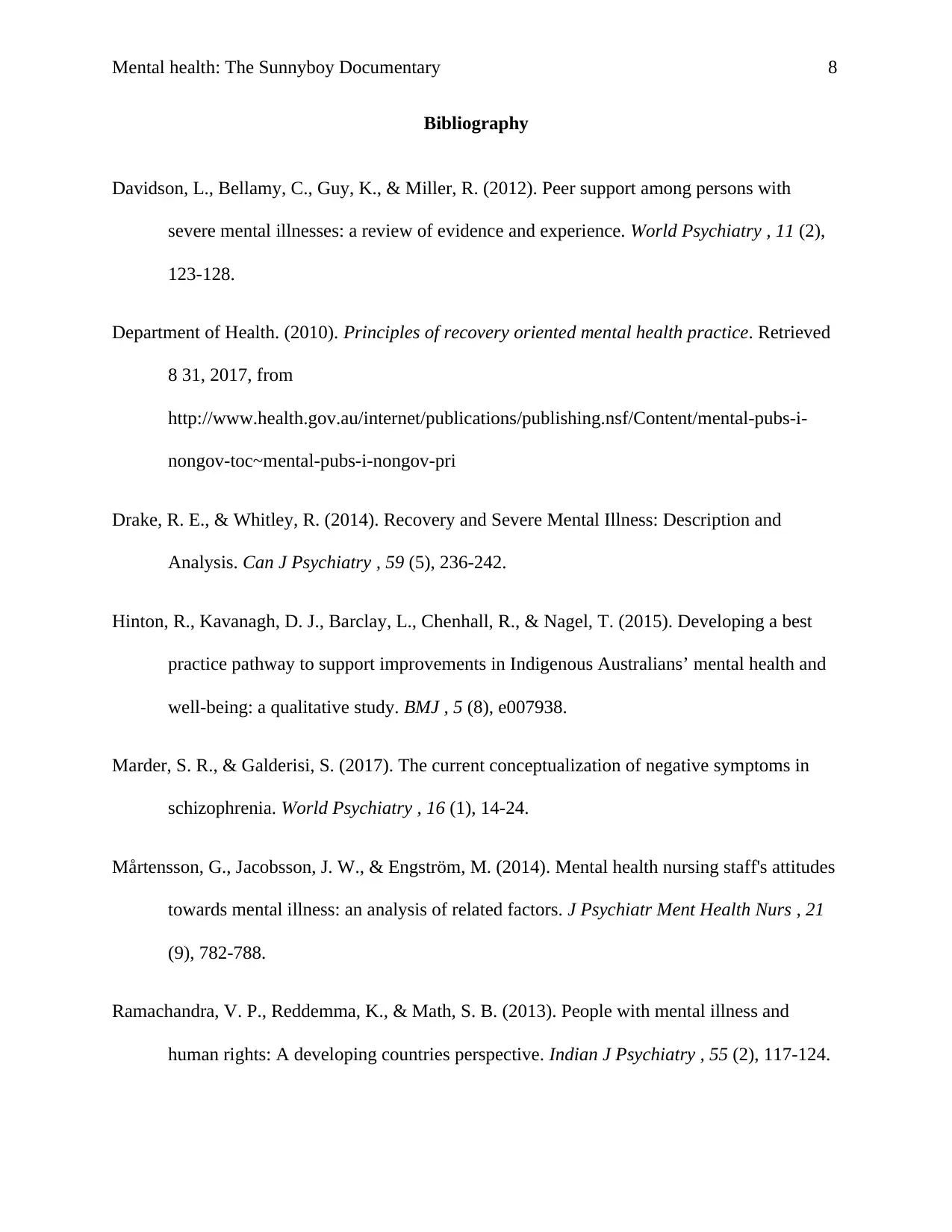
Mental health: The Sunnyboy Documentary 8
Bibliography
Davidson, L., Bellamy, C., Guy, K., & Miller, R. (2012). Peer support among persons with
severe mental illnesses: a review of evidence and experience. World Psychiatry , 11 (2),
123-128.
Department of Health. (2010). Principles of recovery oriented mental health practice. Retrieved
8 31, 2017, from
http://www.health.gov.au/internet/publications/publishing.nsf/Content/mental-pubs-i-
nongov-toc~mental-pubs-i-nongov-pri
Drake, R. E., & Whitley, R. (2014). Recovery and Severe Mental Illness: Description and
Analysis. Can J Psychiatry , 59 (5), 236-242.
Hinton, R., Kavanagh, D. J., Barclay, L., Chenhall, R., & Nagel, T. (2015). Developing a best
practice pathway to support improvements in Indigenous Australians’ mental health and
well-being: a qualitative study. BMJ , 5 (8), e007938.
Marder, S. R., & Galderisi, S. (2017). The current conceptualization of negative symptoms in
schizophrenia. World Psychiatry , 16 (1), 14-24.
Mårtensson, G., Jacobsson, J. W., & Engström, M. (2014). Mental health nursing staff's attitudes
towards mental illness: an analysis of related factors. J Psychiatr Ment Health Nurs , 21
(9), 782-788.
Ramachandra, V. P., Reddemma, K., & Math, S. B. (2013). People with mental illness and
human rights: A developing countries perspective. Indian J Psychiatry , 55 (2), 117-124.
Bibliography
Davidson, L., Bellamy, C., Guy, K., & Miller, R. (2012). Peer support among persons with
severe mental illnesses: a review of evidence and experience. World Psychiatry , 11 (2),
123-128.
Department of Health. (2010). Principles of recovery oriented mental health practice. Retrieved
8 31, 2017, from
http://www.health.gov.au/internet/publications/publishing.nsf/Content/mental-pubs-i-
nongov-toc~mental-pubs-i-nongov-pri
Drake, R. E., & Whitley, R. (2014). Recovery and Severe Mental Illness: Description and
Analysis. Can J Psychiatry , 59 (5), 236-242.
Hinton, R., Kavanagh, D. J., Barclay, L., Chenhall, R., & Nagel, T. (2015). Developing a best
practice pathway to support improvements in Indigenous Australians’ mental health and
well-being: a qualitative study. BMJ , 5 (8), e007938.
Marder, S. R., & Galderisi, S. (2017). The current conceptualization of negative symptoms in
schizophrenia. World Psychiatry , 16 (1), 14-24.
Mårtensson, G., Jacobsson, J. W., & Engström, M. (2014). Mental health nursing staff's attitudes
towards mental illness: an analysis of related factors. J Psychiatr Ment Health Nurs , 21
(9), 782-788.
Ramachandra, V. P., Reddemma, K., & Math, S. B. (2013). People with mental illness and
human rights: A developing countries perspective. Indian J Psychiatry , 55 (2), 117-124.
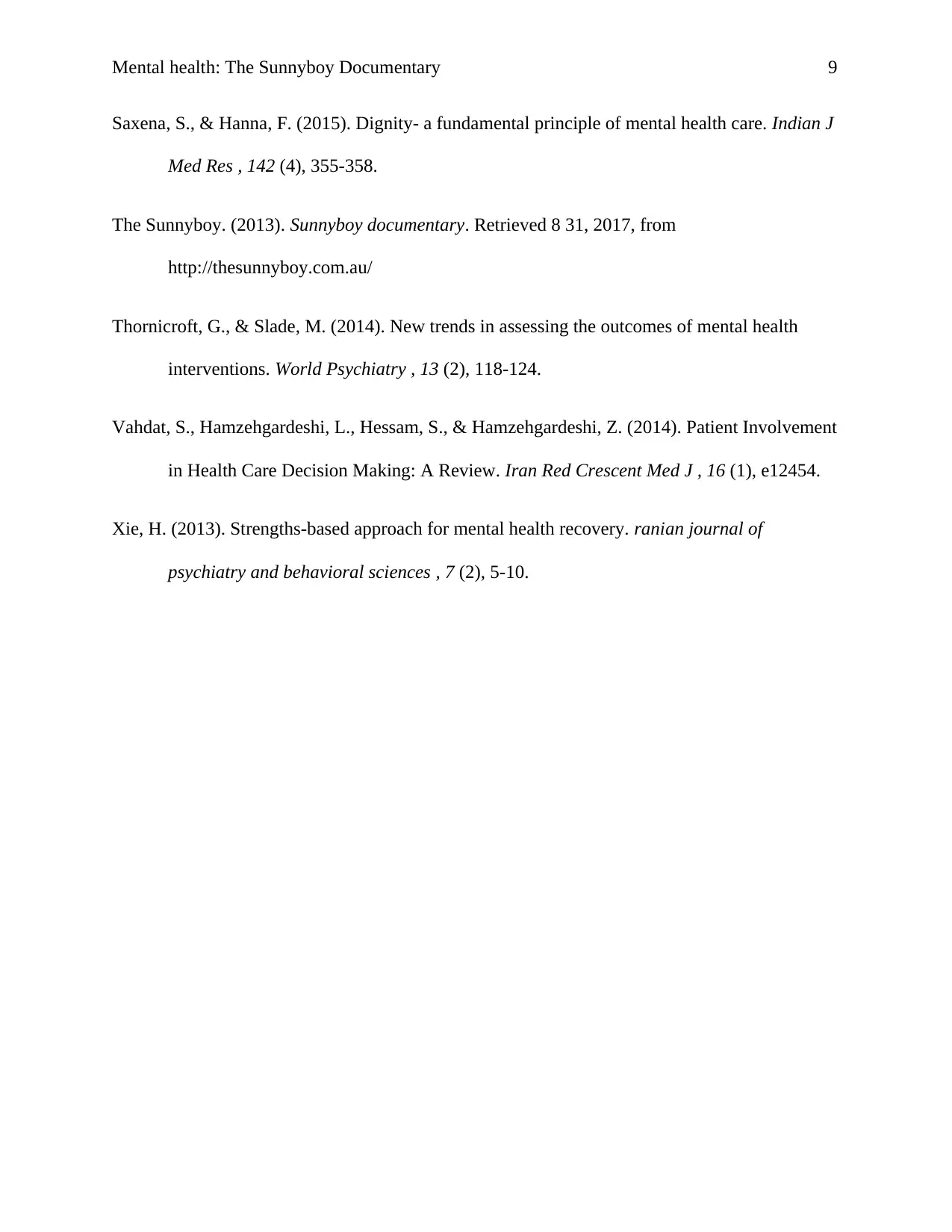
Mental health: The Sunnyboy Documentary 9
Saxena, S., & Hanna, F. (2015). Dignity- a fundamental principle of mental health care. Indian J
Med Res , 142 (4), 355-358.
The Sunnyboy. (2013). Sunnyboy documentary. Retrieved 8 31, 2017, from
http://thesunnyboy.com.au/
Thornicroft, G., & Slade, M. (2014). New trends in assessing the outcomes of mental health
interventions. World Psychiatry , 13 (2), 118-124.
Vahdat, S., Hamzehgardeshi, L., Hessam, S., & Hamzehgardeshi, Z. (2014). Patient Involvement
in Health Care Decision Making: A Review. Iran Red Crescent Med J , 16 (1), e12454.
Xie, H. (2013). Strengths-based approach for mental health recovery. ranian journal of
psychiatry and behavioral sciences , 7 (2), 5-10.
Saxena, S., & Hanna, F. (2015). Dignity- a fundamental principle of mental health care. Indian J
Med Res , 142 (4), 355-358.
The Sunnyboy. (2013). Sunnyboy documentary. Retrieved 8 31, 2017, from
http://thesunnyboy.com.au/
Thornicroft, G., & Slade, M. (2014). New trends in assessing the outcomes of mental health
interventions. World Psychiatry , 13 (2), 118-124.
Vahdat, S., Hamzehgardeshi, L., Hessam, S., & Hamzehgardeshi, Z. (2014). Patient Involvement
in Health Care Decision Making: A Review. Iran Red Crescent Med J , 16 (1), e12454.
Xie, H. (2013). Strengths-based approach for mental health recovery. ranian journal of
psychiatry and behavioral sciences , 7 (2), 5-10.
1 out of 9
Related Documents
Your All-in-One AI-Powered Toolkit for Academic Success.
+13062052269
info@desklib.com
Available 24*7 on WhatsApp / Email
![[object Object]](/_next/static/media/star-bottom.7253800d.svg)
Unlock your academic potential
© 2024 | Zucol Services PVT LTD | All rights reserved.





